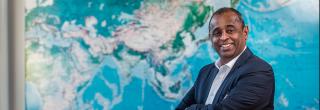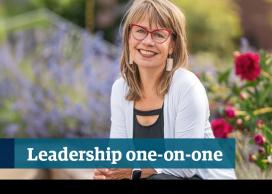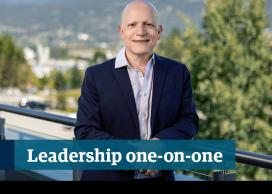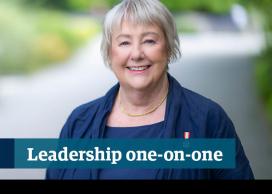Dr. Murali Chandrashekaran is UBC’s first Vice-Provost, International. Born in Bangalore, India, Dr. Chandrashekaran is no stranger to the international scene. He has lived on three continents, and has travelled widely across Asia, Australia, Europe, North America and South America.
He came to UBC in 2011, joining the Sauder School of Business as Director of the Robert H. Lee Graduate School and as Associate Dean, Professional Graduate Programs, and then started his role as Vice Provost, International in September 2017*. With a focus on deepening UBC’s engagement on issues of global relevance, he and his team manage more than 500 active institutional partnership agreements with universities and research institutions in more than 65 countries.
Q1. What quality do you most admire in a leader?
MC: There are several qualities I admire in a leader. While a leader must be able to communicate a clear vision and purpose with transparency, they should also have the ability to engender trust and support their teams to get the job done. What I say to my team is that while my role here is to help co-create a vision and strategy, it is equally or more important to clear roadblocks for you, so that you can be successful; my role is to serve you. While leaders should be demanding of excellence, they should also be very kind, honest and compassionate with how they communicate with others.
Q2. What makes you laugh?
MC: My kids, and the goofy things they do — especially when they think that nobody will find out what they’re up to. I have three girls — thirteen, ten, and eight — and they don’t let me take myself too seriously.
Other than my kids, I’d say Groucho Marx is an all-time favourite. The one line that always brings a smile to my face is when he says to this woman in Animal Crackers, “Ever since I’ve met you, I’ve swept you off my feet.” Good, classic humour.
Q3. Who inspires you, and why?
MC: Those who have faced significant adversity and come through stronger and more resilient, those who have struggled to live a life of meaning and purpose but have come through it with great dignity, and those who are able to be kind and generous no matter what.
Growing up in India, and against convention, my mother resisted the pressure from her parents to get married when she was a teenager. She wanted to study physics, but her parents wouldn’t let her go to college, so she threatened to starve herself. Finally, three days after she stopped eating, her parents sent her off to university where she finished her studies in physics and became an engineer. She entered a male dominated field and experienced blatant discrimination, but somehow still continued to grow professionally. She did all of this while raising four boys and inspiring us to live lives with great purpose. She constantly reminds us that L-I-F-E stands for, “live it for everyone” — it has always been her motto.
Another person who inspires me is my wife, who is kind and generous no matter what. I am learning from her how to look at the best in people and learn to accept differences with grace and kindness.
Q4. What attracted you to UBC? What makes it different?
MC: The purpose, vision, and mission of a university is really important to me, but it was truly the people of UBC and the organizational ambitions that attracted me to this university.
What keeps me here is the privilege of working with people who have given their entire working lives to this university and do it with a commitment to excellence and compassion.
People like Sandy Tanaka, Alina Yukhymets, Cheryl Dumaresq, and Bob Helsley who are focused on getting the best possible outcomes, and do it with great kindness. I love this place.
Q5. What is the most important lesson you’ve learned?
MC: We need to recognize that we live in an interconnected world. It’s not enough to know that we are connected to everybody else, but we need to feel the interconnection within. We need to understand how our actions have wider implications and impact others’ lives, to be able to be thankful for others’ contributions and what they do for us, to acknowledge the work of others and give credit where it is due, and to accept responsibility for our mistakes.
Q6. How do you like to recharge?
MC: I love cooking — I cook every day. My signature dish is ‘chili verde’. I’ve spent weeks and months perfecting it. I experiment with many different cuisines, so now I’m working on cooking dishes from the state of Kerala, in South India. This cuisine uses a lot of seafood, coconut milk, and spices. I cook because I love seeing my kids eat — we all hang out in the kitchen together and it’s great fun.
Q7. What is the best advice you were ever given?
MC: Listen twice as much as you speak. You have two ears and one mouth, so it’s not a bad thing to use them in that proportion. This advice has held me in good standing over the years. It’s less about me impressing what I think on others, and more about being in the moment and hearing what others have to say.
Q8. What do you value in your colleagues?
MC: Passion, bringing dedication to work, and a sense of humanity. Most people in universities are here because they want to create value for this planet.
Q9. If you could have a super power, what would it be?
MC: One is to have the power to produce ‘the endless food bowl’ to eliminate hunger. When I first came to North America, I was introduced to this concept called the bottomless soup bowl. I thought the idea that you could drink as much soup as you possibly wanted was such a neat concept. I also discovered that there’s an organization in India called, Akshaya Patra (the bottomless food bowl). They serve midday meals to kids in economically disadvantaged schools. Every day, they serve 1.5 million meals across different parts of the country. What if I had the super power to produce that? It would be amazing to live in world that has zero hunger.
Q10. What are some upcoming trends in higher education globally?
MC: It’s no surprise that universities tend to be very siloed in disciplines, and there is increasing recognition that institutions have a duty to help address challenges facing our planet, but this can’t be addressed by any one Faculty working on its own. If you look at the strategic plan of several universities, cross-disciplinary learning for societal impact is becoming a real focus.
We’re also seeing an increasing call for the relevance of post-secondary education. As tuition increases, and access to higher education becomes a growing concern, universities will have to ask themselves how they are preparing their leaders to face challenges facing our planet.
And finally, we’re seeing changes in where learning takes place. Most learning used to happen in the classroom, but an increasing trend is to take students from classrooms to, what I’m referring to as, ‘learning cauldrons’. These ‘cauldrons’ exist in different cities, contexts, and locations, where students can interact with, and in, different environments. We’re going to see a shift away from ‘the sage on the stage’ model, to a more collaborative approach where community members play an increasingly important role in the education of our students.
Q11. In practice, what does it mean for UBC to have an International Office, and why is it important for the university to maintain an international focus?
MC: I believe deeply in the idea that universities can play a central role in building a more just and prosperous world. Universities bring people together from all over the world, expose us to knowledge and experiences about the world, and can empower us all to want to solve problems facing our planet. In order to do this, we need to have people from around the world here at our university, and we need UBC to be out in the world. The way in which this connection is facilitated, is through a focused Vice-Provost International team.
At the workbench, we engage in some simple value activities — catalyzing opportunities for scholars and learners, simplifying the process of collaboration, championing innovation in internationalization, fostering safe travel, and being accountable and celebrating success.
Q12. What do you think is UBC’s potential on an international scale?
MC: In a word, I’d say our potential is ‘amazing’. We are already North America’s most international university. Building on this amazing foundation, I would like us to develop and nurture impactful global collaborative networks with academic institutions, corporates, communities, cities and countries, break down silos, and bring diverse stakeholders together to help increase the societal impact of universities and help address the profound problems facing humanity.
The Vice-Provost International team is now embarking on a heatmap study to surface all of the different talents across campus — to identify ‘who does what’ and connect similar areas of focus. If we can eventually convene people with similar areas of focus and give them the opportunity to work together, there is a potential to collaborate, amplify each other’s work and stretch our university’s contribution to this world.
*Dr. Chandrashekaran is the holder of the Fred H. Siller Professorship in Marketing established by SMEI Vancouver in 2000.
Published: July 1, 2018
Interviewed by: Rivka Parris, UBC Internal Communications



